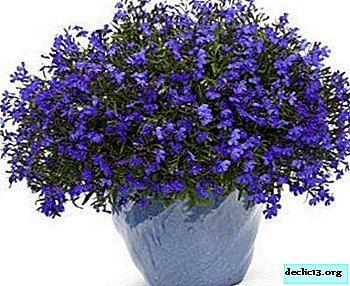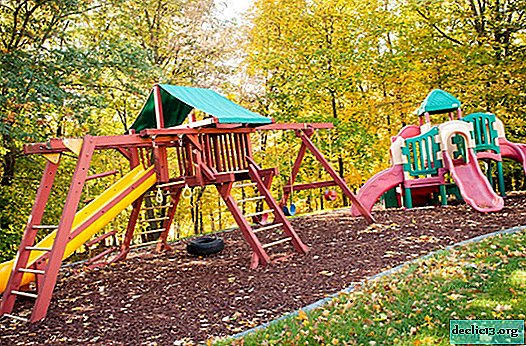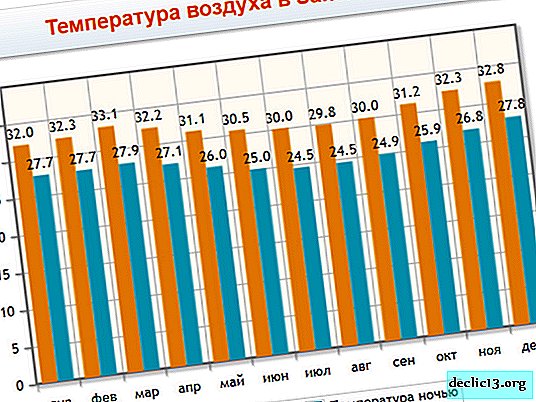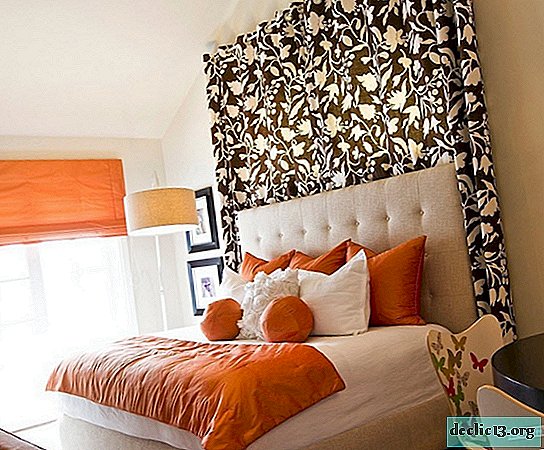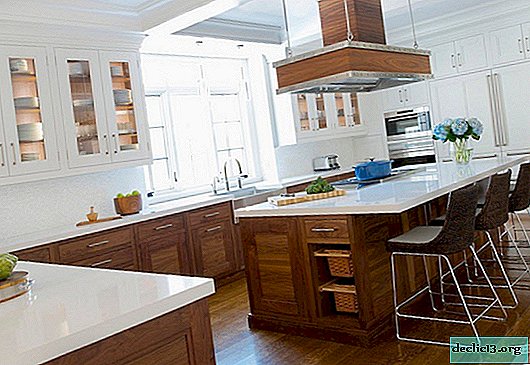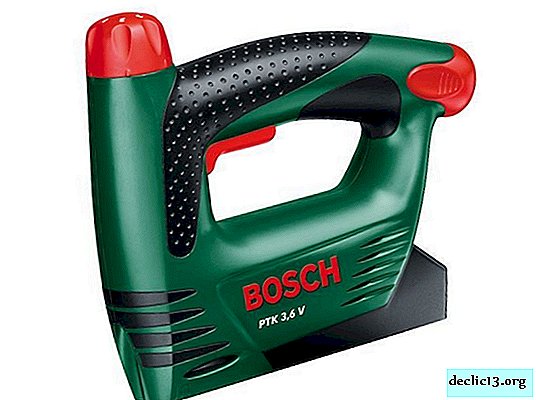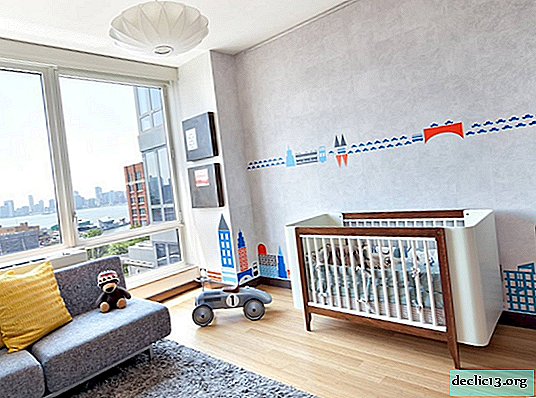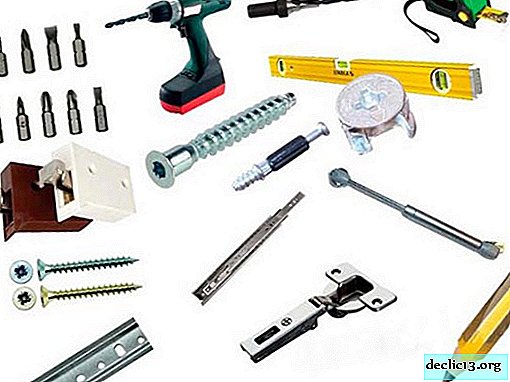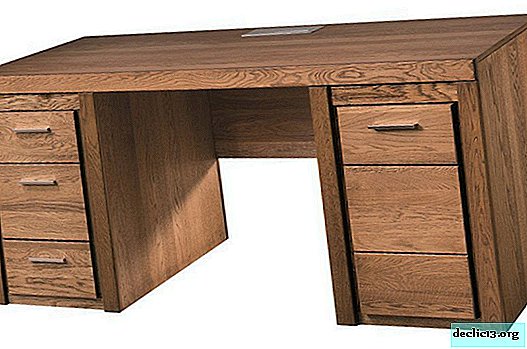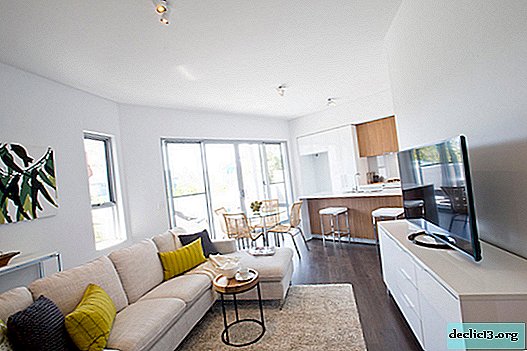Methods for filling cabinets, expert advice
In each house, a closet is a piece of furniture that helps to optimize space and correctly organize storage of things. In order to place clothes, shoes, accessories and other household items in the most rational way, it is important to think about filling the cabinet in as much detail as possible. Depending on the location of the piece of furniture (bedroom, hallway, living room, children's room or study), the internal content may vary slightly. For example, in the bedroom you are unlikely to store seasonal clothes and shoes, and a closet in the hallway is not provided for the home library. However, absolutely all cabinets have a basic set of containers, drawers and appliances necessary for storing things.
Layout and basic elements
Properly planned internal filling of the cabinets will save the space of any room, since all things will find their place, will be stored in strict order and availability. The entire internal volume can be divided into many capacious sections, and its main elements will be:
- shelves of various widths;
- baskets for laundry;
- drawers;
- clothes hangers;
- metal rods (crossbars);
- devices for storing ties, trousers;
- shoe shelves;
- pantographs for easier access to things;
- hooks for bags, umbrellas, keys, accessories.
It doesn’t matter whether you are the owner of an impressive size sliding wardrobe or whether there was only a small cabinet furniture in the room, a wide selection of contents for this piece of furniture and the ability to select it for any furniture sizes you specify will make it easy to purchase interior elements for any wardrobe of your choice desire. The more thoughtful the filling of the cabinet is, the more convenient and ergonomic it will turn out.
There are no clear standards for filling the cabinet. Thinking about the idea of rational and compact placement of things, pay attention to several components:
- if you plan to order a built-in wardrobe - the size of the niche or wall where it will be located;
- how much clothing (its types) and other items you are going to store;
- their financial capabilities.
Ideas of a typical layout can be found in the photo on the Internet, many furniture manufacturers, for the convenience of customers, even suggest compiling it on their own based on the specified cabinet sizes, number of shelves, offering a choice of materials and furniture fittings. You can also pre-calculate financial costs.
Small rooms fit cabinets with one, two doors. Plan internal filling based on the number of sections of at least two, dividing the cabinet into storage areas for hats, long items, shoes, sections for bags, gloves, and items and shoes care products.
Overall cabinets suggest a place where a large number of things will be placed. In addition to standard filling elements, inside you can add sections that store bedding, travel bags, household appliances, while the usable area will be involved much more.
Do not forget that the dimensions of the cabinet should correspond to the size of the clothes intended for placement. For example, a long coat or a fur coat in a low cabinet is deformed and lose their aesthetic appearance.





Design of individual zones
In the photo on the Internet you can find a lot of ideas on the separation and design of zones for placing things in storage systems. Conventionally, the internal content of the cabinets can be divided into several zones, each of which has its own design requirements. There is a certain sequence of distribution of things in the closet:
- rarely used items - on top;
- things that are worn daily - in the middle;
- shoes and large items - from the bottom.
In the center, at the level of an outstretched arm, as a rule, the most necessary shelves are located, where there are items that may be needed at any time and several times a day. You can attach tie holders, hooks for bags or a bathrobe to the side walls.
In the upper zone of the cabinet are usually located:
- shelves for storing suitcases, travel bags, sports equipment;
- offices where off-season shoes will be located.
The middle zone is equipped with brackets, shelves, drawers and is designed for:
- placement of outerwear of different lengths;
- storage of women's and men's light clothing (dresses, skirts, trousers, shirts);
- the location of sweaters, T-shirts.
The lower zone is intended for storage on sliding shelves:
- underwear;
- tights and socks;
- shoes;
- household appliances.
Holders of hats, bags, umbrellas, belts are attached to the side parts of the cabinets. A holder for an iron, a hair dryer, a hose from a vacuum cleaner can be located on swing doors.
 Top
Top Lower
Lower Average
AverageStorage systems for different types of clothes
Cabinets where clothes are stored contribute to a perfect order in the house, when you don’t have to head over heels to look for the right thing, and you know exactly where what is located. At the same time, well-designed storage systems make it possible to free up space from additional furniture cluttering the room. The practicality and functionality of the cabinets depends on how well thought out the internal content of the cabinets is.
Shelves, shelving, drawers, baskets, pantographs, brackets - everything should be planned and selected in the most thorough way. There are storage departments that have a narrow focus and certain sizes. Storage systems are selected for each type of clothing according to the sizes declared by the customer. All racks, shelves for placing wardrobe items are developed by manufacturers taking into account the proportions, a suitable interval between shelves and racks, which will be optimal for comfortable storage of things. The height of the bar for hangers is calculated so that it is convenient to remove and hang clothes if the bar is high, a pantograph is provided - a kind of “elevator” for clothes, which facilitates access to things located at high heights. Various collections for filling furniture will help optimize the cabinet space and turn it into an ideal place to store necessary things.
When selecting the elements of the internal filling of each cabinet, it is necessary to take into account the features of the room, the lifestyle of the owner of the house, his requirements and wishes, calculate the number, size of the necessary shelves, drawers, racks, hangers, additional elements in the form of sliding mirrors or an ironing board, that is, transform the cabinet under certain needs of its owner.
To achieve maximum convenience, you should maintain certain distances:
- between the shelves: for things 30 cm, shoes (without high heels) - 20 cm;
- height of the compartment to the bracket: for outerwear - 160-180 cm, dresses - 150-180cm, jackets, jackets, shirts - 120 cm;
- compartments with devices for storing trousers folded in half - 100 cm, length - 140 cm.
For underwear
Such a delicate wardrobe item requires a particularly careful attitude. If you have enough space in the closet, you can allocate a compartment and hang each set on special plastic or fabric hangers - this is very convenient, and the laundry is stored neatly. You can more compactly arrange your laundry in special honeycomb drawers (up to 30 cm deep) or organizers with cells (a couple of centimeters smaller than the drawer in which it will be located), where you can fold bras, underpants, socks, tights. In small cabinets for storing these elegant things, it is worth adjusting the drawer, equipping it with a separator container, where underwear is stored in one compartment, and socks and tights in the other. On sale there are special plastic partitions that can be installed in a drawer and put items of underwear in cells. With this approach, you will always have the perfect order.





For non-wrinkling things
For non-creasing things, large open shelves are best suited. So wardrobe items are conveniently folded and removed if necessary. Equipped with such shelves is usually the central part of the cabinet. They store jerseys that, when folded, are not subject to deformation and do not crease. The width of such a storage compartment is 50 cm. Knitted items should not be hung on the shoulders, as the product can stretch out and lose its original shape, put larger and heavier clothes on the shelves below, and light clothes on top, so it will not be crushed and wrinkled. Crumpled things can be laid out in baskets, choosing their size so that folded clothes are located freely.




For things on the shoulders
Regardless of the size of your closet, there is always a place to place things on your shoulders. It is convenient, allows you to carefully store clothes, and if necessary, easily and quickly get the right thing. To figure out what height to plan compartments for clothes on the shoulders, you need to measure the longest objects. Of course, for the sake of one evening dress, it is not worth adjusting the height of the bar.
Since things stored on a coat hanger have different lengths, the dimensions of the compartments for their placement are also provided for from 1 meter to 1.8 m.
When determining the width of the compartments for clothes, it should be taken into account that the normal distance between the shoulders is 5 cm, and dense 2 cm. The storage system must have good ventilation to avoid unpleasant odors. The width of the coat hanger hangers ranges from 34 cm to 51 cm, which depends on the size of the clothes, the depth of the cabinet is 50-60 cm.
It is best to provide several compartments of different lengths for storing outerwear and lightweight. If there is only one such compartment (rod length 100-120 cm), a support is necessary - a vertical rod fixed to a horizontal one. In high cabinets, the compartment is equipped with a pantograph, a special device for free access to various types of clothing. This device allows you to use the entire space of the cabinet. For narrow cabinets, pull-out transverse brackets are suitable, which will save space and allow you to place clothes more compactly.
Pantograph is a very convenient thing. There are mechanisms that are manually advanced. For more convenient use, you can order a cabinet with a built-in pantograph, which is easy to control using the remote control.





For accessories
Clothing accessories tend to get lost forever. To avoid this, manufacturers suggest equipping cabinets with special elements: holders for ties and belts or shelves with cells. Small accessories are conveniently stored in small drawers or mesh shelves. Scarves, scarves, umbrellas - on hooks that are attached to the cabinet door.
There are a lot of original, unusual hangers and organizers for accessories (photos on the network will help you make a choice) that will once and for all save you from constant searches for the necessary item and help to organize their storage:
- for scarves, scarves, stoles - hangers with many holes of various shapes;
- for ties - special crossbars with or without clamps;
- for belts and belts - hangers with hooks.





Scissors
Another item of clothing that requires special storage conditions is trousers. Many men are very jealous of the correct placement of this wardrobe item, because on the shelves perfectly ironed trousers lose their prestigious appearance. Scrubs in this case will be a necessary element in your closet. There are several options:
- retractable trouser holder;
- extendable scrubs;
- folding hanger for trousers and belts;
- extendable shelf for trousers with a basket.
Females are attached to the far or side wall of the cabinet; there are one-sided, two-sided.





For shoes
Shoes are usually placed in the lower zone of the closet. Storage locations are equipped with drawers, shelves (inclined or extendable), elements in the form of blocks, which allows you to keep the shape of the shoe. This takes into account the size of objects, the height of the bootleg. Manufacturers offer several types of shoe storage systems:
- retractable - with special pins fixed on a movable frame;
- mesh with shelves or mobile hooks;
- folding drawers shelves with cells;
- open shelves located at the bottom of the cabinet;
- hangers with clothespins for placing boots.
The design idea of placing shoes on a rotating rack located in the lower compartment of the cabinet is interesting.





For bags
For the storage of bags in the cabinet, you can select a separate shelf or fix the hooks on the door. Moreover, it must be taken into account that it is better to store heavy bulk bags on shelves, and lighter and softer bags to hang on hooks or special holders. Oversized items (suitcases and travel bags) should be placed in the upper part of the cabinet or on the mezzanines, since they are not often used.
A few recommendations for storing things:
- after washing and airing, things from knitwear and wool should be carefully placed in plastic bags, then folded onto shelves, so they will look good even after prolonged storage;
- if the height of the wardrobe is not enough for long dresses, it is recommended to throw their hem over the hanger bar to avoid contact with the bottom of the furniture;
- skirts and trousers are best hung by attaching special clothespins on hangers;
- hats should be placed in boxes and then put away in a closet;
- closed shoes should be provided for shoes.




Features of corner designs
When there is not enough space in the room to accommodate a large storage system for things, pay attention to compact angular designs. Due to the fact that such a cabinet occupies the most useless part of the room (corner), its depth increases, and the space is used rationally. The main difficulty in filling such furniture is the use of complex zones in the back of the cabinet, since the angular shape does not provide wide opportunities for placement of storage elements. Shelves are usually installed in standard models, if desired, these places can be adapted for storing narrow and long things, for example, skis and ski poles, cane umbrellas. A right angle is used for clothes on a coat hanger (trempels). In a d-shaped structure between parts where there is no partition, a pole is installed to which the crossbars are attached. If there is a partition, it will be problematic to use this zone (due to inconvenient access), so it is worth storing seasonal clothing there.
Due to some design features of corner cabinets, things fit much more than in direct ones. They resemble a miniature wardrobe rather than a standard wardrobe. Before buying a cabinet, be sure to consider its internal content. The number of shelves, baskets, drawers and many additional elements that will help keep all items in perfect order and provide convenient access to them depends on what things you are going to place there.





